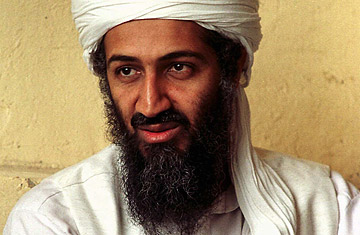
Osama bin Laden in Afghanistan, in an April 1998 file photo
(6 of 6)
Conditions were rougher, of course, when bin Laden was out in the field working, turning Afghanistan into headquarters for a worldwide jihad. Abdul Bari Atwan, editor of the London-based Arab daily al-Quds al-Arabi, recalls visiting bin Laden in November 1996 at a snowbound mountain base called Eagle's Nest. The dinner that was served — fried potatoes and eggs, gritty bread and salty cheese — was "awful, rotten." Bin Laden, Atwan noticed, ate little and drank only water. The men bunked on rough wooden platforms with dirty gray pillows and mattresses. They washed and heeded nature's call outdoors in freezing weather. Still, the camp had a small power generator, computers, modern communications equipment and a large library of clippings from newspapers. Bin Laden received news-service reports from the Persian Gulf and London.
Atwan says bin Laden was filled with grievances. "He was bitter, with the Sudanese, the Egyptians, the Saudis, the Americans — everyone. After he had fought the Soviets, he found himself completely unrewarded. They made his life hell. He was dismissed to go to nowhere."
Afghanistan wasn't quite nowhere. Indeed, by the end of 1996, it had become the best possible base for bin Laden. The Taliban, under the leadership of a scarcely educated cleric, Mullah Mohammed Omar, had taken control of Kabul. Bin Laden and Mullah Omar had a meeting of minds. "The Taliban are religious, anti-modern thinkers, and so was he," says Khashoggi. Bin Laden moved his operations to the southern city of Kandahar, Omar's base.
For once, bin Laden found himself in the position of mentor rather than protégé. "Mullah Omar and the other members of the Taliban are simple men," says retired Lieut. General Javed Ashraf, the former head of Pakistan's powerful security agency, the Directorate of Inter-Services Intelligence. "They have no knowledge of the world outside their corner of Afghanistan. Bin Laden filled this gap. He was a teacher and a companion."
Bin Laden became more daring. When he began giving interviews in Afghanistan, Khashoggi noted a change in tone. Bin Laden claimed that his forces had taken part in the killing of 18 U.S. service members in Mogadishu in 1993. "I said to myself, 'He knows the consequences of admitting that,' " Khashoggi remembers. "He was saying, 'Come and get me. I'm daring you now.' "
By 1998, bin Laden's rage against the U.S. had turned white-hot. In February, with several other militants, he co-signed a fatwa (though he lacked the religious credentials to do so), saying it was a duty for Muslims to kill Americans, including civilians, wherever possible. Khashoggi believes that until that point, bin Laden had been torn between the traditions of his upbringing, which would have precluded targeting civilians, and the more radical approach favored by al-Zawahiri. The Egyptian won that debate.
Three months later, alongside al-Zawahiri and others, bin Laden held a press conference to announce the formation of the International Islamic Front for Jihad Against Crusaders and Jews. A dozen journalists, including a representative of TIME, were taken to Zhawat camp in Afghanistan. As a convoy of Toyota pickups approached, a group of men on a nearby hilltop began firing their weapons in the air. The show of support was staged. The men, it turned out, were not connected to the camp but were local Afghans hired to bring their own guns to make bin Laden's group seem more powerful.
From then on the action sped up. In August 1998 al-Qaeda operatives bombed U.S. embassies in Kenya and Tanzania, killing 224, mostly Africans. Washington retaliated with a cruise-missile attack on Afghanistan that narrowly missed bin Laden. Al-Qaeda struck again in 2000, attacking the U.S.S. Cole in Yemen and killing 17 U.S. service members. Then came Sept. 11 and the start of the war against terrorism.
The Pakistani journalist Hamid Mir may have been one of the last outsiders to be granted an audience with bin Laden. He claims that the Saudi granted him an interview on Nov. 7, 2001, in a secret hideout outside Kabul before the city fell, although a Taliban official later denied that the interview had taken place. Mir says bin Laden's security guards took him to a bathhouse and made him cleanse himself thoroughly once and then again to ensure that his body wasn't dusted with a substance that would tip off the Americans to his location. The interview was conducted over a breakfast of olives, jam, butter, unleavened bread and green tea. Bin Laden, uncharacteristically, had a large appetite and ate voraciously. Mir noticed that he had put on weight. Bin Laden seemed his usual placid self, except when Mir asked about a statement from Mohammed Sayed Tantawi, the grand sheik of al-Azhar University, that the Saudi's view of jihad "doesn't represent Islam." That angered bin Laden.
At one point, Mir says he asked bin Laden whether he would surrender if he became trapped. Bin Laden, the journalist reported, roared with laughter and replied, "I am a person who loves death. The Americans love life. I will engage them and fight. I will not surrender. If I am to die, I would like to be killed by the bullet." On May 1, 2011, in Pakistan, U.S. Special Forces obliged him.
Reported by Hannah Bloch, Michael Fathers and Omar Waraich / Islamabad; Matthew Forney / Jalalabad; Helen Gibson / London; Scott MacLeod / Jidda; Simon Robinson / Khartoum; and Jay Newton-Small / Washington
